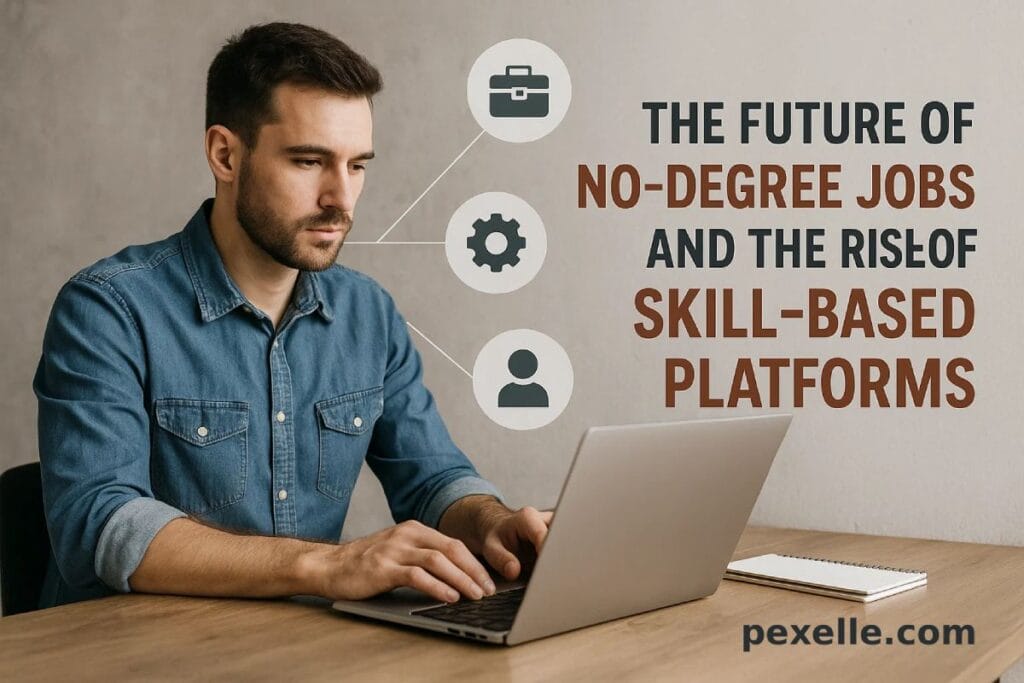The Future of No-Degree Jobs and the Rise of Skill-Based Platforms

For decades, a university degree was considered the ultimate ticket to a good career. It was the gatekeeper — the line between “qualified” and “not qualified.”
But in 2025, that line is fading fast.
Today, skills speak louder than diplomas, and the fastest-growing job opportunities don’t require a formal degree. Instead, they reward people who can prove what they can do — not just what they studied.
This is the era of No-Degree Jobs — powered by skill-based platforms that are rewriting the rules of employment.
🌍 Why Degrees Are Losing Their Grip
A few years ago, a job posting almost always said “Bachelor’s degree required.”
Now, major employers like Google, IBM, Tesla, and PwC have officially removed degree requirements from many positions.
Why?
- ⚡ Technology evolves faster than academic curricula.
- 💼 Companies need skills today, not theoretical knowledge from years ago.
- 🌐 Remote work and global talent have expanded the talent pool.
- 🧠 Alternative education is proving to be more practical, faster, and cheaper.
A recent report by World Economic Forum shows that 44% of employers now prioritize skills over degrees. The job market is shifting from credential-based to capability-based hiring.
🧠 What Are “No-Degree Jobs”?
No-degree jobs aren’t “low-skill” or “easy.” In fact, many of them are high-paying, high-demand roles that value proven abilities:
- 💻 Software development & DevOps
- 📊 Data analytics & AI operations
- 🧭 Digital marketing & growth strategy
- 🧑💻 UX/UI design & product roles
- 🧰 Cloud infrastructure & cybersecurity
- 🎨 Content creation, branding & communication
What matters here isn’t where you learned — but what you can do right now.
🚀 How Skill-Based Platforms Are Changing the Game
This global shift wouldn’t be possible without a new generation of skill-based platforms that are democratizing access to opportunities:
- 🧑🏫 Platforms like Coursera, edX, Udemy, and Pexelle allow people to learn targeted skills quickly.
- 🪙 Micro-credentials and verifiable badges give employers proof of ability.
- 💼 Skill-matching systems pair learners directly with job opportunities.
- 🌐 Blockchain and verification tools make credentials global and tamper-proof.
These platforms are building a world where a 22-year-old without a degree can compete with a master’s graduate — if they can deliver the skills.
🧭 What This Means for Job Seekers
If degrees are no longer the entry ticket, the new strategy is skill stacking and proof of work.
🎯 To thrive in a no-degree job market:
- Learn high-impact, in-demand skills.
- Build a portfolio of real work.
- Earn recognized micro-credentials.
- Keep learning continuously.
- Show verifiable skill proof instead of relying on a CV.
This isn’t a shortcut. It’s a different path — faster, more flexible, and often more powerful.
🏢 Why Employers Benefit Too
Employers aren’t dropping degree requirements out of generosity. They’re doing it because it works:
- ⚡ Faster hiring
- 🧠 Access to global talent
- 💰 Lower training costs
- 🧭 More accurate skill matching
- 🌍 Greater diversity in their workforce
By hiring for skills, companies get people who can perform on day one — not just people who tick boxes.
🪄 Final Thought
Degrees will still matter in some fields. But in most industries, skills have become the new currency.
No-degree jobs aren’t the future — they’re already here.
🎯 “Your degree may open a door. But your skills will keep it open.”
Platforms like Pexelle are part of this transformation — giving individuals the power to learn, prove, and earn on their own terms.
Source : Medium.com




